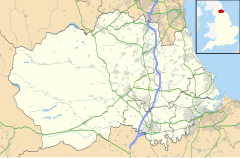Tanfield, Durham
| Tanfield | |
|---|---|
 Back street in Tanfield Lea, County Durham |
|
| Tanfield shown within County Durham | |
| Population | 8,270 (2011.Ward) |
| OS grid reference | NZ191557 |
| Shire county | |
| Region | |
| Country | England |
| Sovereign state | United Kingdom |
| Post town | Durham |
| Postcode district | DH9 |
| Police | Durham |
| Fire | County Durham and Darlington |
| Ambulance | North East |
| EU Parliament | North East England |
Tanfield is a former mining village in County Durham, England, near Stanley, and the location of Tanfield Railway, the Causey Arch and Tanfield School.
The village was first recorded in 1179 as Tamefeld, believed to be Old English for "field by the River Team", but it is mentioned in an account by John of Hexham of the Scottish invasion of 1138. The village church is from the 10th century.
The village has the highest rate of people aged 16–74 who have never worked, the figure stands at 33.33 percent, in the whole of England and Wales.
The village church of St. Margaret of Antioch dates back to 900 AD, but the present structure was built in the 18th century. It was the parish church of Beamish Hall, former home to the Eden, Joicey and Shafto families. There is a Methodist church in Tanfield Lea.
Tanfield was the home of Tommy Armstrong (1848–1919), the "pit-man poet", whose grave is in the village cemetery.
...
Wikipedia

